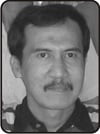The Development of Integrative Model for the Teaching of Indonesian Technical Vocabulary
Abstract
ABSTRACT: The main concern of this research is to develop a teaching model which can promote students’ vocabulary knowledge, especially the qualitative knowledge of the technical vocabulary. The problems underlying the research is that, despite its significance in language learning, vocabulary is methodologically neglected.This is especially true to the teaching of teachnical words. On that basis, this study sets out to generate a teaching model which is effective in boosting students’ qualitative knowledge of technical vocabulary through a set of learning activities commensurate with the curricular requirements, namely, which deems language as a means of communication, which puts students in the core of all concerns and activities, and above all which is applicable for any classroom settings. Another result shows that despite its curricular demand, vocabulary is not taught by the teachers, while the teaching practice for other language areas is still dominated with the teacher-centered activities. The validation test results in significant finding: the model proves effective in evolving students’ qualitative vocabulary knowledge in the experimental class. In other words, the model is effective in teaching the Indonesian technical vocabulary.
KEY WORDS: integrative, model, technical vocabulary, qualitative knowledge, and quantitative knowledge.

About the Author: Dr. Furqanul Aziez is a lecturer at the Muhammadiyah University of Purwokerto (UMP) in Central Java; and also at Pasundan University (UNPAS) in Bandung. He is interested in education and applied linguistics. His email address is: furqonaziez2007@yahoo.co.id
How to cite this article? Aziez, Furqanul. (2008). “The Development of Integrative Model for the Teaching of Indonesian Technical Vocabulary” in EDUCARE: International Journal for Educational Studies, Vol.1(1) August, pp.53-66. Bandung, Indonesia: Minda Masagi Press owned by ASPENSI in Bandung, West Java; and FKIP UMP in Purwokerto, Central Java, ISSN 1979-7877.
Chronicle of the article: Accepted (June 7, 2008); Revised (July 17, 2008); and Published (August 17, 2008).
Full Text:
PDFReferences
Badudu, J.S . & M.T. Zain. (1993). Kamus Umum Bahasa Indonesia. Jakarta: Pustaka Sinar Harapan.
Borg, W.L. & M.D. Gall. (1979). Educational Research: An Introduction. New York: Longman Group Ltd.
Depdiknas [Departemen Pendidikan Nasional]. (2000). Kurikulum Mata Pelajaran Bahasa dan Sastra Indonesia. Jakarta: Depdiknas.
ELPA [English Language Proficiency Assessment]. (2002). Vocabulary Test 001: Medium Level. Available at www.elpa.com/vocabulary/test/med.htm [accessed in Purwokerto: 21/6/2008].
Hazenberg, Suzanne & Jan H. Hulstijn. (1996). “Defining Minimal Receptive Second Language Vocabulary for Non-Native University Students: An Empirical Investigation” in Applied Linguistics, Vol.17, No.2, p.145-160.
Lehr, Fran. (2006). A Focus on Vocabulary. Illinois: University of California Press.
Nation, I.S.P. (1992). “Teaching and Learning Vocabulary” in Applied Linguistics, Vol.13, No.3, p.326-331.
Nurweni, Ari & John Read. (1999). “The English Vocabulary Knowledge of Indonesian University Students” in English for Specific Purposes, Vol.18, No.2, p.161-175.
Read, John. (2000). Assessing Vocabulary. Cambridge: Cambridge University Press.
Templeton, Shane & John J. Pikulski. (2003). “Building the Foundation of Literacy: The Importance of Vocabulary and Spelling Development”. Available at www.eduplace.com/shane/vocabulary.htm [accessed in Purwokerto: 21/6/2008].
EDUCARE: International Journal for Educational Studies. Ciptaan disebarluaskan di bawah Lisensi Creative Commons Atribusi-BerbagiSerupa 4.0 Internasional
